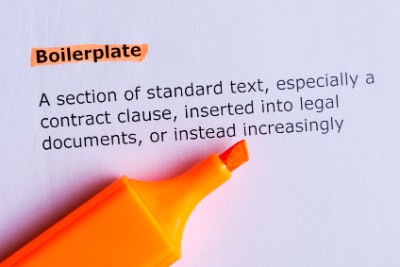 Just because you’ve got signed business contracts doesn’t mean they’re enforceable. In fact, there’s a good chance that one or more provisions of each of your legal agreements can be set aside by a judge as boilerplate contract abuse.
Just because you’ve got signed business contracts doesn’t mean they’re enforceable. In fact, there’s a good chance that one or more provisions of each of your legal agreements can be set aside by a judge as boilerplate contract abuse.
And in some cases, that means the entire agreement is voided if you’re missing some key clauses designed to prevent that from happening.
This is particularly true where a judge believes there’s been unequal bargaining power, i.e. your company had an unfair advantage in contract negotiations or even forced a take-it-or-leave-it agreement on an individual without any modifications. In other words, the court perceives the other party (employee, independent contractor, small supplier, etc.) as being a victim you took advantage of to reach an “unconscionable” agreement.
Such unfairness is typically determined based on clauses concerning non-competition, dispute resolution, intellectual property ownership, and the like…especially if those provisions are drafted totally one-sided in your company’s favor.
Fortunately, there are things an experienced business attorney can do to make your contracts at least partially enforceable.
Now a good agreement favors your business but doesn’t put the other party in such a deep hole that they can’t dig out of it if something goes wrong. In other words, you’re not forcing them to agree to terms that on their surface are so objectionable that the first word that comes to mind when reading them is “ridiculous.”
Naturally, you’ll want your business contracts lawyer to include provisions that protect you too.
For example, there should be a severability provision that makes the rest of the agreement enforceable if the court strikes part of it down as unconscionable or for some other reason.
And if it’s a B2B deal, you want the contract to avoid language that makes it look like the other party is a consumer (instead of a business) because there are consumer protection laws that make it harder to enforce boilerplate agreements.
In addition, you may want to have your agreements reflect that both parties have had the opportunity to have the agreement reviewed by their respective legal counsel before signing. And that the contract shouldn’t be construed against either party as the drafter of the agreement’s language.
Choice of law, methods and location of dispute resolution, and who pays for what in a dispute are other terms your business lawyer can craft to maximize enforceability.
If you’re using a template for your agreements prepared by your legal counsel, that’s okay. To avoid unenforceability because of boilerplate contract abuse, just make sure that it makes sense to use the template in each deal. Have it tweaked as-needed to prevent fundamental unfairness that jeopardizes enforcement. In other words, don’t assume your standard “boilerplate” language that’s fair in Deal A will be automatically enforceable in Deal B, Deal C, etc. where the parties and other details can be substantially different.
